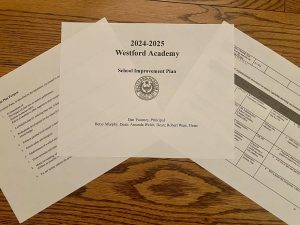New dual enrollment course ‘Money Matters’ coming to WA for 2023-24
When it comes to money matters, “it is not always about how much money you earn, but how you manage it”, Ricard said.
March 29, 2023
The business department at WA has added a new dual enrollment course titled “Money Matters”, offered for juniors and seniors. It is a semester Dual Enrollment (DE) course offered at WA with 2.5 credits. The Money Matters course requires a few prerequisites, noted in the WA Program of Studies, some of which include a GPA of at least 2.0 and a score of 480 or higher on the PSAT or SAT English section. It is a personal finance-related course, and the enrollment is through Middlesex Community College (MCC) as well as WA. Students will be able to further their skills in budgeting money, dealing with finances, and understanding credit and taxes.
Sarah Ricard, one of four business teachers at WA, will be teaching the course as an adjunct professor at Middlesex Community College. Grades will be inputted through the WA system as well as the MCC system.
Regardless of what career students will go into in the future, Ricard says that this class will be useful, as finances are something everyone has to manage.
The Money Matters course carries AP weight, but is not a traditional College Board AP course, as students taking this course will not have to take an AP exam later in May.
The Money Matters course consists of a combination of lectures, activities, and projects, and will be similar to the Personal Finance course currently offered at WA. There will also be a long-term research project, which is envisioned as a form of a final presentation, with details to be decided.
Unit one of the Personal Finance course discusses banking basics, such as having a bank account along with different types of accounts one may have; Unit two explores income, employment, and taxes. Units three and four cover budgeting and consumer skills, where students can learn how to set up and track their spending. Unit five dives into credit and debt, followed by unit six, which goes into financing higher education. Unit seven wraps things up by covering insurance.
For credits, every student taking this course will not only receive 2.5 credits through WA but also one college credit through MCC. However, students will not have to physically leave WA to take this course; instead, the DE course will be added to their 7-day rotation schedule as one of their blocks. Also, an MCC transcript will be received by each student who takes this course at the end of the semester. Additionally, there is a fee for receiving the 1 credit at MCC, a mandatory cost of $126.00 paid to MCC around Oct. of 2023.
Moreover, Ricard also believes that taking a personal finance-related course should be a requirement for all students to graduate, especially with lots of teens getting sent out into the world and into college without having the knowledge or experience of how to navigate financial decisions.
“With technology, many young people have 24/7 access to information and shopping and can even access their bank account at their fingertips, but none of that teaches them how to properly budget or spend wisely. When teens check their banking app to see if they have enough money for Chipotle, that is not budgeting,” said Ricard.
Students interested in the course also need to take note of certain forms to complete such as obtaining a signature from the student’s family, qualifying scores from the PSAT or SAT, and a signature from an English teacher, according to Ricard.
Ricard points out that one main characteristic of a successful Personal Finance student is active participation. She enjoys students who are engaged during classroom discussions and are willing to put in the effort to expand their understanding beyond the material taught in the classroom and create the lives they want with financial freedom.
“No matter what path [you take], this is relevant,” Ricard said. “This is a special opportunity for all students, to earn both college credit and high school credit at the same time.”







